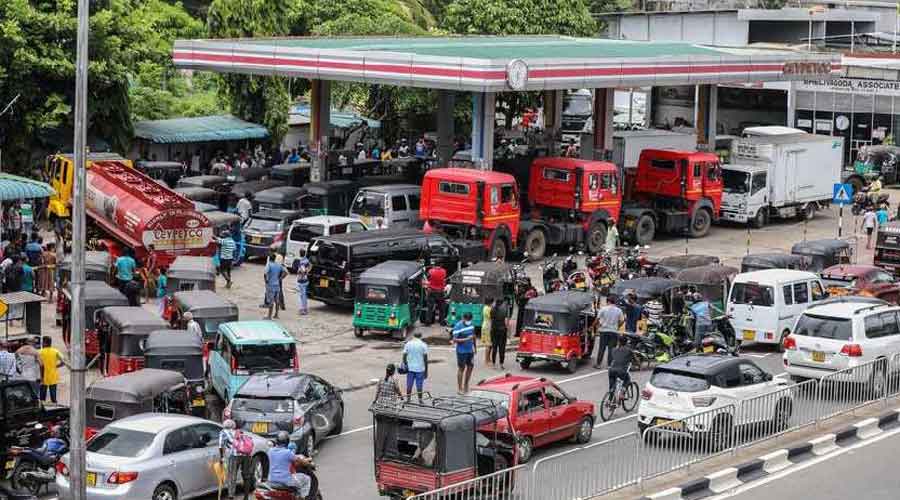“No es suficiente” — It’s not enough. That was the message protest leaders in Ecuador delivered to the country’s President this past week after he said he would lower the price of both regular petrol and diesel by 10 cents in response to riotous demonstrations over soaring fuel and food prices.
The fury and fear over energy prices that have exploded in Ecuador are playing out the world over. In the US, average fuel prices, which have jumped to $5 per gallon, are burdening consumers and forcing an excruciating political calculus on President Biden ahead of the midterm congressional elections this autumn.
But in many places, the leap in fuel costs has been much more dramatic, and the ensuing misery much more acute. Families worry about how to keep the lights on, fill the car’s fuel tank, heat their homes and cook their food.
Businesses grapple with rising transit and operating costs and with demands for wage increases from their workers. In Nigeria, stylists use the light of their cellphones to cut hair because they can’t find affordable fuel for the petrol-powered generator. In Britain, it costs $125 to fill the tank of an average family-size car. Hungary is prohibiting motorists from buying more than 50 litres of petrol a day at most service stations.
Last Tuesday, police in Ghana fired tear gas and rubber bullets at demonstrators protesting against the economic hardship caused by petrol price increases, inflation and a new tax on electronic payments.
The staggering increase in the price of fuel has the potential to rewire economic, political and social relations around the world. High energy costs have a cascading effect, feeding inflation, compelling central banks to raise interest rates, crimping economic growth and hampering efforts to combat ruinous climate change.
The invasion of Ukraine by Russia, the largest exporter of oil and gas to global markets, and the retaliatory sanctions that followed have caused gas and oil prices to gallop with astounding ferocity.
The unfolding calamity comes on top of two years of upheaval caused by the Covid-19 pandemic, off-andon shutdowns and supply chain snarls. The spike in energy prices was a major reason the World Bank revised its economic forecast last month, estimating that global growth will slow even more than expected, to 2.9 per cent this year, roughly half of what it was in 2021.
In Europe, an over-dependence on Russian oil and natural gas has made the continent particularly vulnerable to high prices and shortages. In recent weeks, Russia has been ratcheting down gas deliveries to several European countries. Across the continent, countries are preparing blueprints for emergency rationing that involve caps on sales, reduced speed limits and lowered thermostats.
As is usually the case with crises, the poorest and most vulnerable will feel the harshest effects. The International Energy Agency warned last month that higher energy prices have meant an additional 90 million people in Asia and Africa do not have access to electricity. Expensive energy radiates pain, contributing to high food prices, lowering standards of living and exposing millions to hunger.
Steeper transportation costs increase the price of every item that is trucked, shipped or flown — whether it’s a shoe, cellphone, soccer ball or prescription drug. In many places, livelihoods are already being upended. Dione Dayola, 49, leads a consortium of about 100 drivers who cruise metropolitan Manila picking up passengers in the minibuses known as jeepneys.
Now, only 32 of those drivers are on the road. The rest have left to search for other jobs or have turned to begging. Before pump prices started rising, Dayola said, he would bring home about $15 a day. Now, it’s down to $4. “How do you expect to live on that?” he said.
To augment the family income, Dayola’s wife, Marichu, sells food and other items on the streets, he said, while his two sons sometimes wake at dawn and spend about 15 hours a day in their jeepneys, hoping to earn more than they spend.
The Philippines buys only a minuscule amount of oil from Russia. But the reality is that it doesn’t really matter whom you buy your oil from — the price is set on the global market.
Everyone is bidding against everyone else, and no country is insulated, including the US. Persistently expensive energy is stirring up political discontent not only in places where the war in Ukraine feels remote or irrelevant but also in countries that are leading the opposition to Russia’s invasion.
Last month, Biden proposed suspending the tiny federal fuel tax to reduce the sting of $5-a-gallon petrol. And Biden and other leaders of the Group of 7 this past week discussed a price cap on exported Russian oil, a move that is intended to ease the burden of painful inflation on consumers.
New York Times News Service











